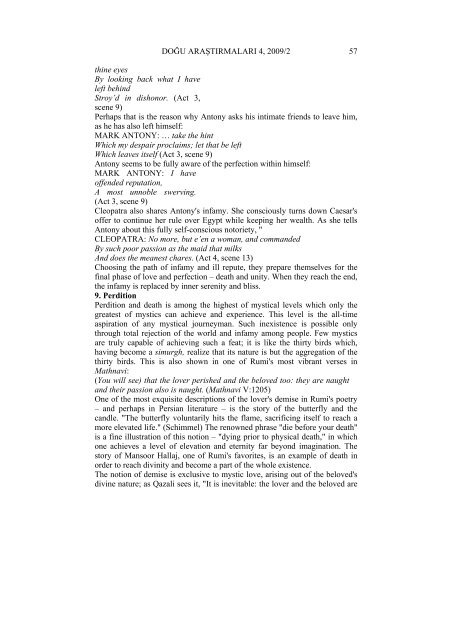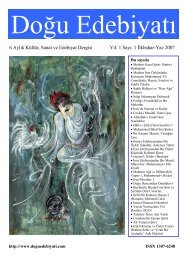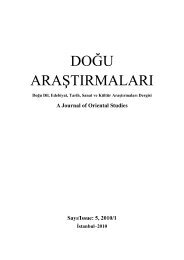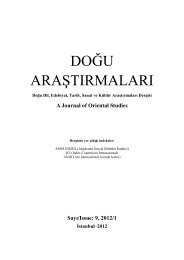A Journal of Oriental Studies Sayı/Issue - Doğu Edebiyatı
A Journal of Oriental Studies Sayı/Issue - Doğu Edebiyatı
A Journal of Oriental Studies Sayı/Issue - Doğu Edebiyatı
You also want an ePaper? Increase the reach of your titles
YUMPU automatically turns print PDFs into web optimized ePapers that Google loves.
DOĞU ARAŞTIRMALARI 4, 2009/2 57<br />
thine eyes<br />
By looking back what I have<br />
left behind<br />
Stroy’d in dishonor. (Act 3,<br />
scene 9)<br />
Perhaps that is the reason why Antony asks his intimate friends to leave him,<br />
as he has also left himself:<br />
MARK ANTONY: … take the hint<br />
Which my despair proclaims; let that be left<br />
Which leaves itself (Act 3, scene 9)<br />
Antony seems to be fully aware <strong>of</strong> the perfection within himself:<br />
MARK ANTONY: I have<br />
<strong>of</strong>fended reputation,<br />
A most unnoble swerving.<br />
(Act 3, scene 9)<br />
Cleopatra also shares Antony's infamy. She consciously turns down Caesar's<br />
<strong>of</strong>fer to continue her rule over Egypt while keeping her wealth. As she tells<br />
Antony about this fully self-conscious notoriety, "<br />
CLEOPATRA: No more, but e’en a woman, and commanded<br />
By such poor passion as the maid that milks<br />
And does the meanest chares. (Act 4, scene 13)<br />
Choosing the path <strong>of</strong> infamy and ill repute, they prepare themselves for the<br />
final phase <strong>of</strong> love and perfection – death and unity. When they reach the end,<br />
the infamy is replaced by inner serenity and bliss.<br />
9. Perdition<br />
Perdition and death is among the highest <strong>of</strong> mystical levels which only the<br />
greatest <strong>of</strong> mystics can achieve and experience. This level is the all-time<br />
aspiration <strong>of</strong> any mystical journeyman. Such inexistence is possible only<br />
through total rejection <strong>of</strong> the world and infamy among people. Few mystics<br />
are truly capable <strong>of</strong> achieving such a feat; it is like the thirty birds which,<br />
having become a simurgh, realize that its nature is but the aggregation <strong>of</strong> the<br />
thirty birds. This is also shown in one <strong>of</strong> Rumi's most vibrant verses in<br />
Mathnavi:<br />
(You will see) that the lover perished and the beloved too: they are naught<br />
and their passion also is naught. (Mathnavi V:1205)<br />
One <strong>of</strong> the most exquisite descriptions <strong>of</strong> the lover's demise in Rumi's poetry<br />
– and perhaps in Persian literature – is the story <strong>of</strong> the butterfly and the<br />
candle. "The butterfly voluntarily hits the flame, sacrificing itself to reach a<br />
more elevated life." (Schimmel) The renowned phrase "die before your death"<br />
is a fine illustration <strong>of</strong> this notion – "dying prior to physical death," in which<br />
one achieves a level <strong>of</strong> elevation and eternity far beyond imagination. The<br />
story <strong>of</strong> Mansoor Hallaj, one <strong>of</strong> Rumi's favorites, is an example <strong>of</strong> death in<br />
order to reach divinity and become a part <strong>of</strong> the whole existence.<br />
The notion <strong>of</strong> demise is exclusive to mystic love, arising out <strong>of</strong> the beloved's<br />
divine nature; as Qazali sees it, "It is inevitable: the lover and the beloved are





